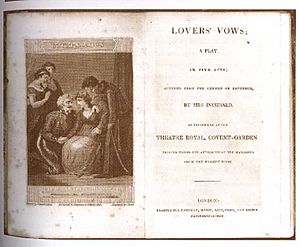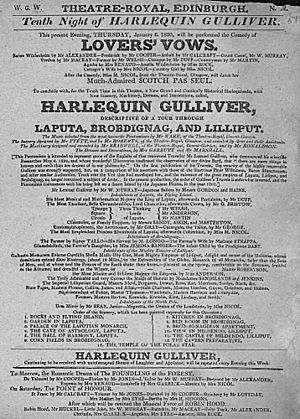Lovers' Vows facts for kids
The play Lovers' Vows (written in 1798) was created by Elizabeth Inchbald. It's famous for being mentioned in Jane Austen's book Mansfield Park (published in 1814). This play is one of several English versions of a German play called Das Kind der Liebe (which means "Love Child"). Inchbald's version was the only one that was actually performed on stage.
Contents
First Performance of the Play
The play Lovers' Vows was first shown at Covent Garden in London on October 11, 1798. It was a huge hit right away! The play ran for 42 nights, making it the most successful show at Covent Garden that season. It was also performed in other cities like Bristol, Newcastle, and Bath.
The play was popular as a book too. However, some people debated its message. For example, Anne Plumptre, who translated the original German play, thought Inchbald had changed a character too much. But many others defended the play's good messages about kindness, honor, and forgiveness.
Lovers' Vows is still remembered today because of its role in Jane Austen's novel Mansfield Park. People often discuss what Jane Austen herself thought about the play.
Original Actors in the Play
Here are the actors who performed in the first production:
- Mr. Murray played Baron Wildenhaim.
- Mr. Knight played Count Cassel.
- Mr. H. Johnston played Anhalt.
- Mr. Pope played Frederick.
- Mr. Munden played Verdun the Butler.
- Mr. Thompson played the Landlord.
- Mr. Davenport played the Cottager.
- Mr. Rees played the Farmer.
- Mr. Dyke played the Countryman.
- Mrs. Johnson played Agatha Friburg.
- Mrs. H. Johnston played Amelia Wildenhaim.
- Mrs. Davenport played the Cottager's Wife.
- Miss Leserve played the Country Girl.
- There were also actors playing Huntsmen, Servants, and others.
What Happens in the Play
Act I: A Mother and Son Meet Again
The play begins with Agatha being forced to leave an inn because she has no money left. She is very sad and doesn't want to beg. Her son, Frederick, appears. He has been away for five years as a soldier. He offers her money, even though it means he won't be able to buy his own breakfast.
Agatha realizes he is her son. Frederick has returned to find his birth certificate so he can get a job. Agatha sadly tells him there isn't one. She explains that when she was 17, she fell in love with Baron Wildenhaim. He promised to marry her, and they had a child together. But the Baron broke his promise and married a richer woman. Agatha was left alone to raise Frederick. Frederick is upset to find his mother so poor. He arranges for her to stay with some kind villagers.
Act II: Secrets and New Loves
Frederick leaves to try and find money. The villagers tell Agatha about Baron Wildenhaim, who is now a widower with a daughter. Agatha faints when she hears this news.
Meanwhile, the Baron wants his daughter, Amelia, to marry Count Cassel. But Amelia clearly doesn't like the Count, who is very proud and silly. It's clear to the audience that Amelia loves Anhalt, a poor clergyman, and he loves her too. We also learn that the Baron regrets his past mistakes and has tried to make up for them for a long time.
Act III: A Desperate Act
Frederick is desperate because he hasn't been able to get any money. He tries to rob the Baron and the Count while they are hunting, not knowing who they are. Frederick is arrested.
Anhalt talks to Amelia about marriage, as the Baron asked him to. But Amelia tells Anhalt that she loves him, and he admits he loves her too. They are interrupted by Verdun, the butler, who brings news of Frederick's attack on the Baron. The Baron enters, and Amelia begs him to be kind to the unknown young man. But the Baron insists that Frederick must be punished to set an example.
Act IV: Truths Revealed
Amelia brings food to Frederick in prison. He then realizes who he tried to rob. He asks to speak to the Baron alone.
The Baron confronts the Count about his behavior. The Count replies that many men act the same way. Confused, the Baron sends him away. Amelia comes back and tells her father that she loves Anhalt. Anhalt then interrupts them, telling the Baron that Frederick is in the next room and wants to talk privately. Frederick then tells the Baron that he is his son. The Baron is very shocked and moved by this news.
Act V: Forgiveness and Happiness
Anhalt goes to Agatha at the cottage. He explains some things that make the Baron's past actions seem a little less harsh.
Frederick, and then Anhalt, tell the Baron that he should marry Agatha. The Baron is worried about their different social classes, but he finally agrees. Because Anhalt gave him good advice, the Baron also agrees to let Anhalt marry Amelia, even though Anhalt is poor. Agatha enters the room, and everyone is finally happy and reconciled.
 | Audre Lorde |
 | John Berry Meachum |
 | Ferdinand Lee Barnett |



